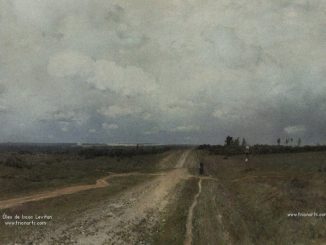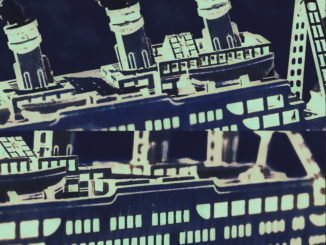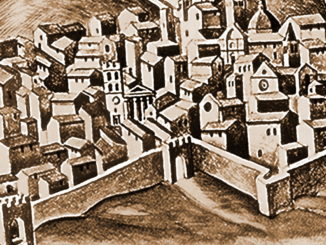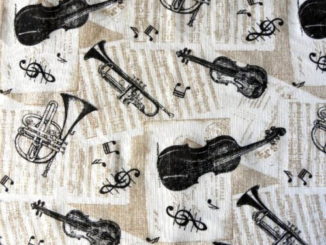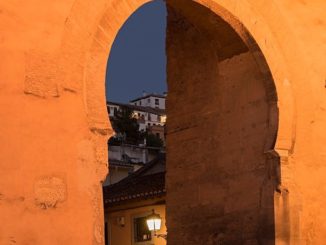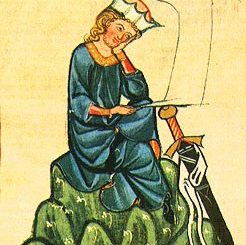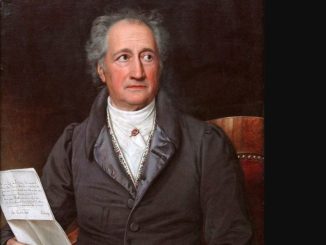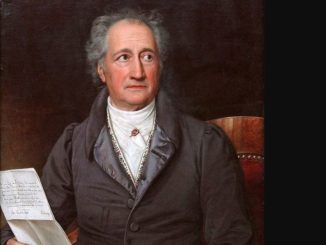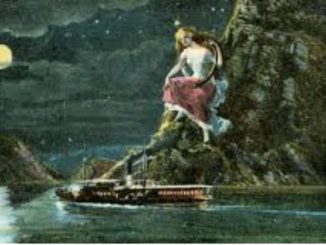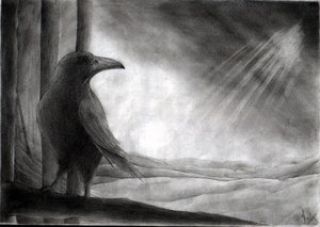
A holló
(The Raven)
Egyszer, sivár éjfélórán,
Elmerengtem gyengén, mélán
Néhány furcsa könyv kötött le;
Rég feledett fóliáns.
Fejem végül lebólintott,
Majd hirtelen zaj riasztott,
Kopogtatásnak hallatszott
Ajtómon a koppanás.
„Vendégt?l van – így motyogtam –
Ajtómon a koppanás.
Csak az lehet, senki más.”
Ó, de milyen jól emlékszem:
Padlómon a zord december
Parázs-árnya lidércképpen
Imbolygott – halódva bár.
Mohón vágytam virradatra,
Gyógyírért könyvet lapozva,
S enyhet nem találva búmra;
Hogy Lenórám oda már,
E ritka tünde-lény, kinek
Ím, csak angyal-név dukál,
Hisz itt névtelen lett már.
S úgy t?nt, hogy a bíbor firhang
Selyme mögül jött a vélt hang,
Melyt?l frász jött rám, egyfajta
Sosem érzett borzadás.
Szívemet, hogy megnyugtassam,
Ekképp egyre biztatgattam:
„Nyughass, csak egy vendég,
Halkan esd itt bebocsáttatást.
Csak egy éji vándor, pontban
Itt esd bebocsáttatást.
Ki a csuda lenne más?”
Megszilárdult lelkem nyomban,
Nem is tétováztam hosszan:
„Uram! – szóltam – vagy Asszonyom!
Bárki légy, már megbocsáss,
De tény: épp elszundítottam
És Te olyan roppant halkan
Jöttél, s mintha szordínóban
Szólt volna e kopogás.
Hallottam-e, az se biztos.”
Ajtóm tártam, s nem vitás:
Csak az éj kint, senki más.
Bámulva a mély sötétbe,
Álltam ott, döbbenten, félve,
Álmodtam, s még nem kísértett
Halandót íly álmodás.
Amúgy csönd és rezzenetlen
Minden, tán egy szó, ha rebben,
Csak egy szó: „Lenóra –
így hangzott a suttogás.
Én motyogtam csak: „Lenóra!”,
– s visszhangzott a suttogás.
Csak ez hangzott, semmi más.
Visszaléptem hát lakomba,
Bévül lángolt lelkem pokla,
S mint imént, csak zajosabban,
Újra szólt a kopogás.
„Persze – gondoltam nyugodtan –
Csak egy gally a rácsozatban,
S rázza, hadd lám, mi van ottan?
Most kiderül a csalás.
Percre nyugton légy még szívem,
Most kiderül a csalás.
Csak a szél lesz, senki más.”
Spalettám tártam óvattal,
S szárnycsapdosva, dirrel-durral
Berontott egy roppant holló –
T?nt korokból vén követ.
S még csak reám sem bagózva,
Meg sem állva, tétovázva,
Cs?rét f?rendként fent-hordva,
Megült épp ajtóm felett.
Pallasz mellszobrára röppent,
S megült pont ajtóm felett.
Gubbasztott, mást mit se tett.
Néztem, hogy illem-kívánta,
Komoly, mord pofákat vágva
Ült ott – így mosolyra váltva
Búmat – ez ében madár.
„Bár a tollad csapzott, tépett,
Nem t?nsz Te kóbor csibésznek,
?s-holló vagy, b?sz kísértet,
Éj-honból, mely visszavár.
Mondd, hogy szólít Plútó népe
Éj-honban, mely visszavár?”
S szólt a holló: „Sohamár.”
Meglepett, hogy ez iromba
Szárnyas eme szót tagolta.
Helytálló volt, s találó,
Ha értelmes aligha bár.
Ámde mindent egybevéve,
Volt-e már halandó-féle
Ily madárral áldva-verve,
Ki megül az ajtaján,
Bestia, ki szobron posztol
És megül az ajtaján?
Ilyen névvel: „Sohamár”.
És a holló, ülve szobrán,
Csak e szót szajkózta, mondván:
Lelke-vezérelte cs?re
Eme szóra visszajár.
Egyéb hangot el nem rebbent,
Szárnya, tolla, meg se rezzent,
S míg sutyorogtam ijedten:
„Barátom mind oda már,
Elt?nik holnapra ? is, mint
Reményem, messze jár.”
Szólt a holló: „Sohamár.”
Szava újra megdöbbentett,
S hogy replikája íly korrekt,
Bár nyilvánvaló, hogy minden
Szókincse csak ebb?l állt.
Gazdájától ragadhatott rá,
Kit többször egymás után
Sorscsapások érhettek tán,
S mint reményei gyászdalát
Dallta gyakran e bús refrént –
Reményei gyászdalát.
Ezt a „Soha-sohamárt”.
Érdekelt, s búmat el?zte,
Hát mosollyal ültem szembe
Hollómmal és szobrommal,
Hol egy jó karszék öble vár.
Süpped?s bársonyba d?ltem
És eszmét eszméhez f?ztem,
Egyre csak azon t?n?dtem:
Mit ért e zord ?s-madár,
Mit ért azon ez a gyászos,
Komor, baljós ?s-madár,
Mit ért azon: „Sohamár”?
Eképp elmélkedtem róla,
Ámde egy kukkot se szólva
Hozzá, aki izzó szemmel
Keblem mélyit vájva vár.
Egysmást megsejtvén csak ültem,
S fejjel vánkosba merülten,
Bársony ölelésbe d?ltem;
S lámpásom – vén kéjsóvár –
(Mert e bársonyt nem érinti) –
Csak meredt rám, gúnnyal bár
(Szép Lenórám soha már.)
S mintha a lég s?r?bb lenne:
Füstöl?t himbálnak benne
Angyalkák, míg padlón lábuk
Csilingelve táncot jár.
„Nyomorult – sírtam fel végre –
Urad megszánt, nézz az égre,
Gyógyírt küld szíved sebére;
Feledést rejt e pohár.
Jó nepenthéd kortyold, kortyold,
S majd megnyugvás üdve vár!”
S szólt a holló: „Sohamár.”
„Rossz jós – szóltam – sátánfajzat,
Ki volnál, követ, vagy állat,
Küldötte a vén gonosznak,
Vagy csak viharvert madár?
Ha már vet?dtél e tájra,
E horror-, s varázstanyára,
Lakba, mely kísértetjárta,
Mondd: odaát úgye jár,
Jut majd balzsam Gileádban?
Válaszod nékem kijár.”
S szólt a holló: „Sohamár.”
„Rossz jós – szóltam – sátánfajzat,
Próféta, ördög, vagy állat,
Mondd meg, hogyha Istent ismersz,
S hitünk, ha egy srófra jár;
Mondd, hogy messzi Éden-mélyben,
Búval bélelt lelk? éjem
Véget ér szent ölelésben;
Ott Lenórám úgye vár?
E ritka tünde-lény, kinek
Már csak angyal-név dukál.”
S szólt a holló: „Sohamár.”
„Ez a szó legyen hát búcsúd.
Cs?rös démon, kísérts másutt!
Eriggy vissza a viharba,
Plútó éje visszavár!
Távozz, ne leljek utánad
Tollpihét se, hazug állat!
Hagyd lelkem örök magánynak,
Hagyd el szobrom, csúf madár!
Tépd ki szívemb?l rút cs?röd,
S hordd el irhád, csúf madár!
S szólt a holló: „Sohamár.”
És a holló el nem röppen,
Csak ül ottan, csak ül ott fenn.
Pallasz sápadt mellszobrán,
Pont ajtóm felett, s egyre vár.
Néha, mintha szenderegne,
Pilled tán a démon benne,
De lámpám az árnyát egyre
Írja padlómra, be kár!
S így lelkem, kit e rút árnyék
Ragacsa padlómba zár;
Fel nem szállhat sohamár!
THE RAVEN
by Edgar Allan Poe
1845
Once upon a midnight dreary, while I pondered, weak and weary,
Over many a quaint and curious volume of forgotten lore,
While I nodded, nearly napping, suddenly there came a tapping,
As of some one gently rapping, rapping at my chamber door.
„‘Tis some visitor,” I muttered, „tapping at my chamber door-
Only this, and nothing more.”
Ah, distinctly I remember it was in the bleak December,
And each separate dying ember wrought its ghost upon the floor.
Eagerly I wished the morrow;–vainly I had sought to borrow
From my books surcease of sorrow–sorrow for the lost Lenore-
For the rare and radiant maiden whom the angels name Lenore-
Nameless here for evermore.
And the silken sad uncertain rustling of each purple curtain
Thrilled me–filled me with fantastic terrors never felt before;
So that now, to still the beating of my heart, I stood repeating,
„‘Tis some visitor entreating entrance at my chamber door-
Some late visitor entreating entrance at my chamber door;-
This it is, and nothing more.”
Presently my soul grew stronger; hesitating then no longer,
„Sir,” said I, „or Madam, truly your forgiveness I implore;
But the fact is I was napping, and so gently you came rapping,
And so faintly you came tapping, tapping at my chamber door,
That I scarce was sure I heard you”–here I opened wide the door;-
Darkness there, and nothing more.
Deep into that darkness peering, long I stood there wondering,
fearing,
Doubting, dreaming dreams no mortals ever dared to dream before;
But the silence was unbroken, and the stillness gave no token,
And the only word there spoken was the whispered word, „Lenore!”
This I whispered, and an echo murmured back the word, „Lenore!”-
Merely this, and nothing more.
Back into the chamber turning, all my soul within me burning,
Soon again I heard a tapping somewhat louder than before.
„Surely,” said I, „surely that is something at my window lattice:
Let me see, then, what thereat is, and this mystery explore-
Let my heart be still a moment and this mystery explore;-
‘Tis the wind and nothing more.”
Open here I flung the shutter, when, with many a flirt and
flutter,
In there stepped a stately raven of the saintly days of yore;
Not the least obeisance made he; not a minute stopped or stayed
he;
But, with mien of lord or lady, perched above my chamber door-
Perched upon a bust of Pallas just above my chamber door-
Perched, and sat, and nothing more.
Then this ebony bird beguiling my sad fancy into smiling,
By the grave and stern decorum of the countenance it wore.
„Though thy crest be shorn and shaven, thou,” I said, „art sure no
craven,
Ghastly grim and ancient raven wandering from the Nightly shore-
Tell me what thy lordly name is on the Night’s Plutonian shore!”
Quoth the Raven, „Nevermore.”
Much I marvelled this ungainly fowl to hear discourse so plainly,
Though its answer little meaning–little relevancy bore;
For we cannot help agreeing that no living human being
Ever yet was blest with seeing bird above his chamber door-
Bird or beast upon the sculptured bust above his chamber door,
With such name as „Nevermore.”
But the raven, sitting lonely on the placid bust, spoke only
That one word, as if his soul in that one word he did outpour.
Nothing further then he uttered–not a feather then he fluttered-
Till I scarcely more than muttered, „other friends have flown
before-
On the morrow he will leave me, as my hopes have flown before.”
Then the bird said, „Nevermore.”
Startled at the stillness broken by reply so aptly spoken,
„Doubtless,” said I, „what it utters is its only stock and store,
Caught from some unhappy master whom unmerciful Disaster
Followed fast and followed faster till his songs one burden bore-
Till the dirges of his Hope that melancholy burden bore
Of ‘Never–nevermore’.”
But the Raven still beguiling all my fancy into smiling,
Straight I wheeled a cushioned seat in front of bird, and bust and
door;
Then upon the velvet sinking, I betook myself to linking
Fancy unto fancy, thinking what this ominous bird of yore-
What this grim, ungainly, ghastly, gaunt and ominous bird of yore
Meant in croaking „Nevermore.”
This I sat engaged in guessing, but no syllable expressing
To the fowl whose fiery eyes now burned into my bosom’s core;
This and more I sat divining, with my head at ease reclining
On the cushion’s velvet lining that the lamplight gloated o’er,
But whose velvet violet lining with the lamplight gloating o’er,
She shall press, ah, nevermore!
Then methought the air grew denser, perfumed from an unseen censer
Swung by Seraphim whose footfalls tinkled on the tufted floor.
„Wretch,” I cried, „thy God hath lent thee–by these angels he
hath sent thee
Respite–respite and nepenthe, from thy memories of Lenore!
Quaff, oh quaff this kind nepenthe and forget this lost Lenore!”
Quoth the Raven, „Nevermore.”
„Prophet!” said I, „thing of evil!–prophet still, if bird or
devil!-
Whether Tempter sent, or whether tempest tossed thee here ashore,
Desolate yet all undaunted, on this desert land enchanted-
On this home by horror haunted–tell me truly, I implore-
Is there–is there balm in Gilead?–tell me–tell me, I implore!”
Quoth the Raven, „Nevermore.”
„Prophet!” said I, „thing of evil–prophet still, if bird or
devil!
By that Heaven that bends above us–by that God we both adore-
Tell this soul with sorrow laden if, within the distant Aidenn,
It shall clasp a sainted maiden whom the angels name Lenore-
Clasp a rare and radiant maiden whom the angels name Lenore.”
Quoth the Raven, „Nevermore.”
„Be that word our sign in parting, bird or fiend,” I shrieked,
upstarting-
„Get thee back into the tempest and the Night’s Plutonian shore!
Leave no black plume as a token of that lie thy soul hath spoken!
Leave my loneliness unbroken!–quit the bust above my door!
Take thy beak from out my heart, and take thy form from off my door!”
Quoth the Raven, „Nevermore.”
And the Raven, never flitting, still is sitting, still is sitting
On the pallid bust of Pallas just above my chamber door;
And his eyes have all the seeming of a demon’s that is dreaming,
And the lamplight o’er him streaming throws his shadow on the
floor;
And my soul from out that shadow that lies floating on the floor
Shall be lifted–nevermore!
Legutóbbi módosítás: 2019.07.09. @ 15:17 :: Rossner Roberto


